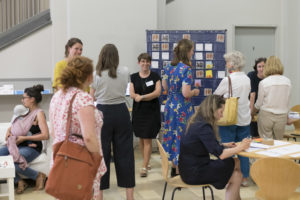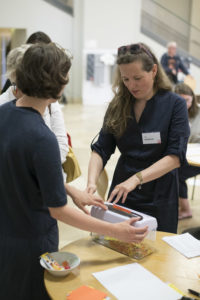By Inge Zwart
Memory studies, heritage studies, and social theory theorize on collective memory: how is it shaped, which memories are included, who is ‘creating’ them and why? This involves an abstract form of thinking which all POEM fellows are engaged in, and has real-life outcomes in the way we shape institutions, how we interact with people and within groups and the type of infrastructures we use and produce for memory making. Simultaneously, remembering and forgetting happens in our everyday lives, all the time, without us noticing it.
The purpose of the Archive of Forgotten Memories is to think together with others about the processes of remembering and of forgetting and what modalities we use for this, as an individual or as an institution. People are invited to submit a ‘memory’ to the archive and reflect on questions posed by the archival team. Their submitted memory – a representation of this memory visualized on a simple piece of paper – is destroyed by a paper shredder and through this process ‘forgotten’ and anonymized. This symbolic gesture allows for a critical investigation of what forgetting is: can we actively engage in such processes? Then, with permission of the memory’s owner, we take a picture of the remnants and subsequently upload it to our online archive.
This physical activity simplifies ‘forgetting’ and mirrors such processes as archival storing and the destruction of documents. Now, conflating the personal with the institutional and vice-versa. Throughout this process, we start conversations with participants about our everyday practices, the role of memory institutions in our lives, the place of symbolism and ceremonies in culture and the dichotomy between individual vs. collective memory. The conversations highlight the POEM research regarding these practices. We ask visitors to elaborate on their reflections by filling out one of our postcards with the question: why do we forget?

Image copyright of Staatliche Museen zu Berlin, Museum Europäischer Kulturen / Christian Krug
Archive of Forgotten Memories at MEK
POEM fellows Inge Zwart, Susanne Boersma and Franziska Mucha hosted the first One Stop Shop at the Museum of Europäischer Kulturen conference in June. The Archive of Forgotten Memories was set up for one afternoon in the foyer of the museum where the conference participants started and ended guided tours through the exhibitions. While the participants were dropping in and out of the tours, they were invited to think about remembering and forgetting.
We invited participants to join us at two work stations where they could write down the memory they would like to forget and to manually shred this memory. As the hosts we guided this process, invited people to join in our reflections on remembering and forgetting and submitted the memories to our online archive – which was updated live on a screen. Most importantly, we were able to share with the conference participants the different research projects that are part of POEM.
What resulted was an exciting opportunity for the fellows to interact on a meaningful level with the conference participants. Participants were conference attendees such as museum practitioners dealing with very practical issues related to our research and academics that study related questions, as well as unexpected visitors to the museum. The memories that were forgotten were ranging from divorce to scary French teachers to smells visualized as chemical formulas. Most memories were kept private, though, by writing in a language the hosts did not understand or simply making sure we did not see. Approximately 25 people anonymized their memories through the shredding process, of which 17 memories were submitted to the archive. During the 1,5 hours of the OSS installation, the POEM fellows and the conference participants discussed the practices of museums and archives in forgetting and remembering; the meaning, possibilities or opportunities of forgetting in our society; the role of digital media as our own ‘personal’ archive; and the question of ‘actively’ forgetting. These conversations allowed the fellows to discuss POEM’s research and stake in these types of interactions. The participatory element provided a fruitful way to interact with colleagues and scholars, appreciated both by the fellows and the conference participants as a valuable alternative to conference paper presentations.

Image copyright of Staatliche Museen zu Berlin, Museum Europäischer Kulturen / Christian Krug
Future installations
There lies a challenge and opportunity ahead for the OSS, with a goal of publicly communicating the research of the POEM fellows as well as meaningfully connecting with professionals in various industries. Important questions in its development are how the OSS can become an extension of our research and where there is space to expand the digital focus.
The response of participants at the MEK revealed a sincere interest in the installation, with some practitioners even asking when they would be able to host the archive installation at their institution. It gestures to the value of the OSS as a public engagement tool and participatory event. Considering the One Stop Shop as an extension of our individual research projects would mean to approach the installation as something between a conference paper, a research experiment and a participatory event. It requires us to think about our role as researchers and facilitators and create new grounds on which we can conduct our research. What happens when you conflate doing and presenting research? How can interacting directly with professionals, the public or industry guide our research? What does this mean for research integrity? Perhaps it leads us to redeveloping an understanding of doing participatory research all the while engaging in interesting conversations with academics and non-academics alike.
Second, digital media ecologies are a crucial part to POEM’s research. Digital developments drastically change our cultures of remembering and forgetting, and the fellows are engaged in understanding the future of such changes. Bringing this more into the center of the OSS would highlight these research results and promote conversations about digital solutions to challenges related to participatory memory practices. So, central to the development of the OSS will be: how can we meaningfully and better engage participants in conversations regarding digital infrastructures? What is feasible within the OSS and will keep the participative, conversational, and reflective approach so valued within the Archive of Forgotten Memories?
In continuous development, the OSS will pop-up at more research and cultural events in the future. The POEM fellows are excited to engage in conversation about their research throughout Europe. If you want to engage people in thinking about forgetting and remembering, consider hosting a POEM OSS at your next open science event, museum night or conference. We are happy to talk with you about possibilities to come by and share our research in our participative installation. Reach out to Inge Zwart or Samantha Lutz for more information.
* The One Stop Shop (OSS) is part of POEM’s communication plan. A model more popular within the hard and life sciences, engineering and IT industries, the OSS provides a space to interactively engage with the general public and professionals to present cutting edge research and provide new solutions to problems faced by institutions and industries. The Archive of Forgotten Memories was the first version of an OSS by POEM.

